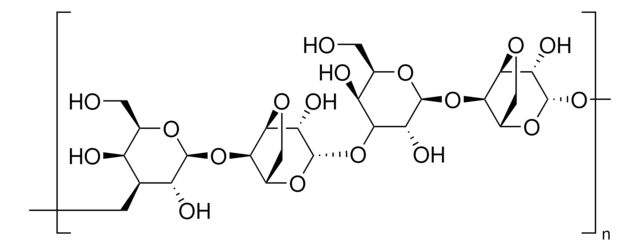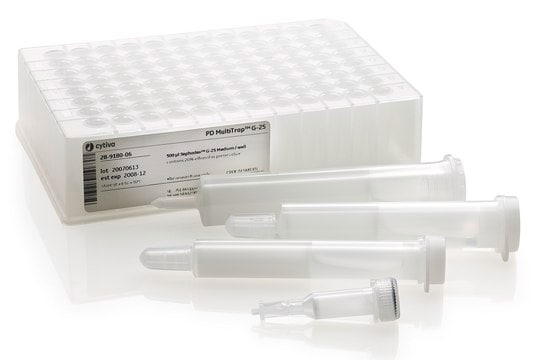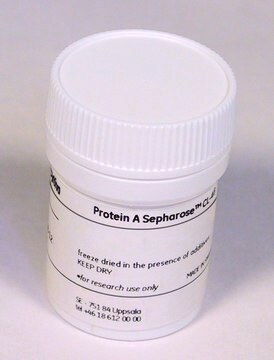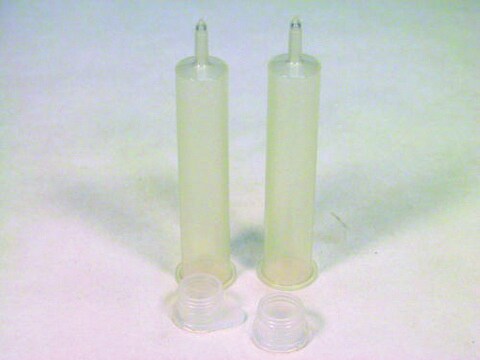18887
Byzen Pro™ Protein A resin
suitable for affinity chromatography
Sign Into View Organizational & Contract Pricing
All Photos(1)
About This Item
UNSPSC Code:
13111000
Recommended Products
form
suspension
Quality Level
technique(s)
affinity chromatography: suitable
mean particle size
70 μm
storage temp.
2-8°C
Related Categories
Application
Byzen Pro™ Protein A resin is an affinity chromatography medium in which a novel Protein A mutant is used as a ligand. Conventional protein A resins use strongly acidic buffers to elute antibodies, exposing the target antibody to the risks of aggregation and decreased activities. In contrast, this temperature- responding Byzen Pro™ Protein A resin allows antibodies to be eluted under neutral pH by a simple temperature change. This eliminates any risk of aggregation and decreased activity of the antibody, improving manufacturing efficiency for pharmaceutical antibodies.
Features and Benefits
Typical Product Profile:
Bead Structure, Cross-linked polyvinyl alcohol, Mean Particle Size 70 μm, Max. Back Pressure 0.3 MPa, Flow Rate (Recommended) 125-250 cm/h, pH Range (Recommended) pH 6-8, Ligand: Recombinant Protein A mutant, Ligand Immobilization: Multiple ligation, Dynamic Binding Capacity (20 cm column): 26 g/L (250 cm/h) 34 g/L (125 cm/h), Total Binding Capacity 40 g/L, Binding Temperature Below 10°C, Eluting Temperature 37 to 40°C, Mode of Temperature Change: Conventional heat exchange system can be used.
Bead Structure, Cross-linked polyvinyl alcohol, Mean Particle Size 70 μm, Max. Back Pressure 0.3 MPa, Flow Rate (Recommended) 125-250 cm/h, pH Range (Recommended) pH 6-8, Ligand: Recombinant Protein A mutant, Ligand Immobilization: Multiple ligation, Dynamic Binding Capacity (20 cm column): 26 g/L (250 cm/h) 34 g/L (125 cm/h), Total Binding Capacity 40 g/L, Binding Temperature Below 10°C, Eluting Temperature 37 to 40°C, Mode of Temperature Change: Conventional heat exchange system can be used.
Legal Information
Byzen Pro is a trademark of Nomadic Bioscience Co., Ltd
Storage Class Code
10 - Combustible liquids
WGK
WGK 3
Flash Point(F)
Not applicable
Flash Point(C)
Not applicable
Certificates of Analysis (COA)
Search for Certificates of Analysis (COA) by entering the products Lot/Batch Number. Lot and Batch Numbers can be found on a product’s label following the words ‘Lot’ or ‘Batch’.
Already Own This Product?
Find documentation for the products that you have recently purchased in the Document Library.
Ichiro Koguma et al.
Journal of chromatography. A, 1305, 149-153 (2013-07-31)
We attempted to evaluate a novel purification method of immunoglobulins (IgGs) by using a mutant type of protein A. Although this mutant protein A binds to IgGs at 5°C, the IgGs are released at 40°C; hence, it was designated as
Our team of scientists has experience in all areas of research including Life Science, Material Science, Chemical Synthesis, Chromatography, Analytical and many others.
Contact Technical Service





